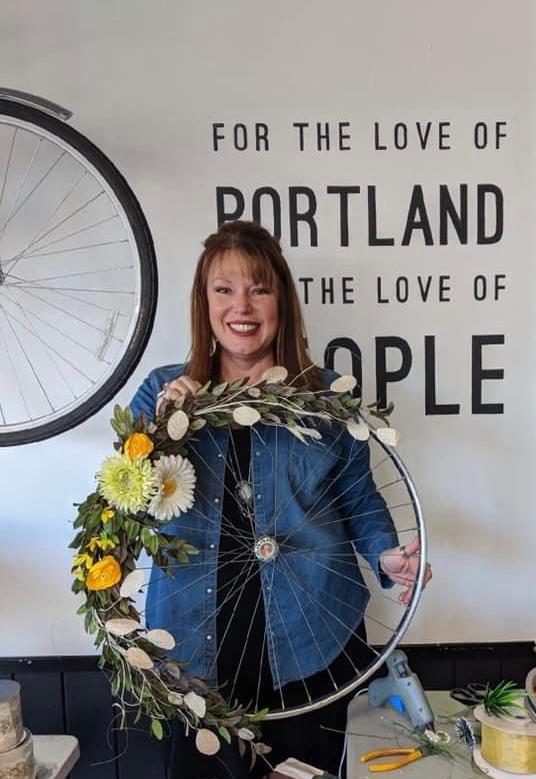
Rhona Mah (Brant)‘07 l knows what it’s like to be disregarded, like a penny on the ground. People might notice you, but they don’t see your value.
That was the inspiration behind the penny floor in Braking Cycles, a Portland-based nonprofit Mahl founded that offers apprenticeship programs to marginalized youth. Mahl wants everyone to know their worth. More than 200 volunteers helped lay more than 148,000 pennies on the shop’s floor – a testament to their belief in the program and its young participants.
Mahl is the executive director of Transitional Youth, an organization dedicated to serving marginalized youth that are “caught in the cycles of abuse, poverty, addiction, sex trafficking, homelessness, and hopelessness.” Braking Cycles operates under the umbrella of Transitional Youth.
Mahl, a Warner Pacific University alum, draws on her own difficult childhood experiences to help reach youth in similar circumstances.
“I was born into homelessness in New Orleans,” Mahl said. “I went from the hospital to a family car. I lived homeless for the first seven years of my life. The only home that I knew was the car. I slept on the floorboard of the car until I was 7 years old. Half of my siblings had been given up. I didn’t know them for a long time. My dad was abusive toward my mom and towards us.”
Mahl’s mother talked Mahl’s father into driving them to Portland, where she and her children were able to escape his abuse.
“We got our very first home,” Mahl said. “She got a job and took care of us the best she could. Until she couldn’t anymore.”
Mahl hasn’t seen her father since he left when she was 10 years old. Her mother worked three jobs to try and support them, but it was difficult. Mahl ran away from home at age 13 and couch surfed until she “exhausted her welcome.”
When Mahl ended up in juvenile detention, her mother signed to get her out, but wasn’t able to support her, so Mahl was on her own.
She ended up back on the streets and pregnant at age 14.
“That’s where the Lord allowed me to meet him,” Mahl said. “I was on the streets and using drugs and pregnant. Walking down the street, I fell. I just went down to the ground.”
She said she was instantly sober, and heard the words, “This baby isn’t going anywhere.”
“I said, ‘God if that’s you, I need help,” Mahl said. “I knew it was God and I needed to make decisions. I needed to hide from places and people I had been around. I started to hide and avoid those places and situations. That is where the Lord revealed himself to me. He rescued me from that place.”
When she graduated high school, Mahl’s daughter was 4 years old.
“I devoted my life to working with youth,” she said. “I needed every key to open the doors. You get doors closed in your face if you don’t have education. And that’s why I was devoted to my education.”
While she was working and raising a family, Mahl earned her associate’s degree in mental health and human services at Mt. Hood, her Bachelor of Science in Human Development at WPU, and a master’s degree in strategic leadership from Life Pacific University.
“I had a lot of things to juggle but I appreciated the opportunity,” Mahl said. “And if it weren’t for the night classes I wouldn’t have been able to do it.”
In her leadership role at Transitional Youth and Braking Cycles, Mahl uses her lived experiences of hardship, survival and thriving to support youth in meaningful ways.
“We work with girls in every demographic that I was in,” Mahl said. “Really it was what God challenged me with.”
She likens her vision to Noah building the ark.
“(God) just planted the blueprint in my head and I couldn’t shake it,” Mahl said.
Braking Cycles has two components – a coffee shop and bike shop. In the coffee shop, youth can gain job experience as baristas. The bike shop sells bikes and offers youth an opportunity to learn to be skilled bike technicians. Outside of the shops, the crew combines those two components with the Coffee Bike – a mobile coffee shop of sorts they use to sell cold brew coffee and Italian sodas at community events.
“At the heart is Christ,” Mahl said. “And also steering people away from systems that keep them trapped in poverty.”
The young people who go through the program become family, Mahl said.
“The greatest need in our city is not a house or job,” she said. “It’s the lack of healthy relationships. That really is the greatest need that these young people have. (With Braking Cycles and Transitional Youth), they become part of a healthy tribe.”
